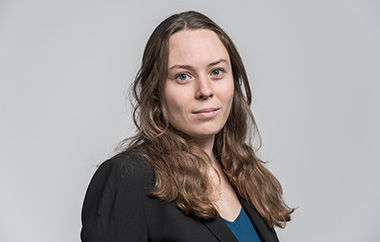PhD in Energy and Environment
Current position: Researcher in Energy System Analysis, RISE Research Institutes of Sweden, Sweden
Research focus: transitions in energy systems connected to climate change mitigation policies
When large societal transformations such as decarbonisation of the energy system take place, it is difficult to use previous knowledge for predicting future outcomes. While computer models can offer an explanation and are crucial for policy analysis, traditional models fail to account for non-rational behaviour and actor interactions and are often based on assumptions of optimisation or economic equilibrium. Liv is developing models that, by using methods from the field of complex systems, behavioural economics, and game theory, better account for how the behaviour of individual actors, the interaction between them and policies are a part of shaping the system.
Following the research stay at the Hochschule für Politik in Munich, Liv worked for the Swedish Government as an analyst and policy expert in an investigation on new policies for biogas. The global sustainability challenges are extremely complex, meaning that consequences of actions/policies intended to mitigate problems are hard to foresee. As a physicist and engineer who has also studied Industrial Ecology, Economics, and Psychology, Liv is well placed to take on this challenge.
CV as submitted for the Green Talents award (2017):
Chalmers University of Technology, Sweden
Research focus: transitions in energy and land-use systems connected to climate change mitigation policies
When large societal transformations, such as decarbonisation of the energy system take place, they make it difficult to use previous knowledge for predicting future outcomes. Computer models can offer an explanation.They process otherwise unmanageable amounts of data and enable scenario building where different possible future trajectories can be explored. Such models are therefore an important consideration for policy analysis in the energy sector. However, traditional models fail to account for non-rational behaviour and the interactions between actors. They are also often based on assumptions of optimisation or economic equilibrium. Liv’s research is focused on developing and working with models that, by using methods from the field of complex systems, behavioural economics and game theory, better account for how the behaviour of individual actors and the interaction between them are a part of shaping the system.
The global sustainability challenges that humanity faces are extremely complex. They span time and space and are interlinked in complicated patterns. This means that actions taken to mitigate one problem might worsen another, or even create new ones. In order to better foresee outcomes, in addition to scientific innovations, new perspectives are required, encompassing economics, politics, psychology and many other fields. As a physicist and engineer who has also studied industrial ecology, economics and psychology, Liv is well placed to take on this challenge.
The jury acknowledged the relevance of Liv’s research to Germany. With the Energiewende, Germany is undergoing significant growth in renewable energy usage and thus forms part of her study, which focuses on energy system transitions towards high levels of solar and wind power penetration. The jury is therefore keen to observe how Liv’s comprehensive models will predict future outcomes.






